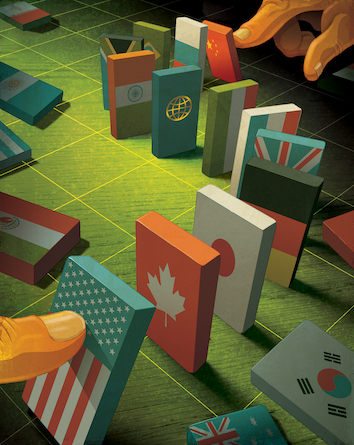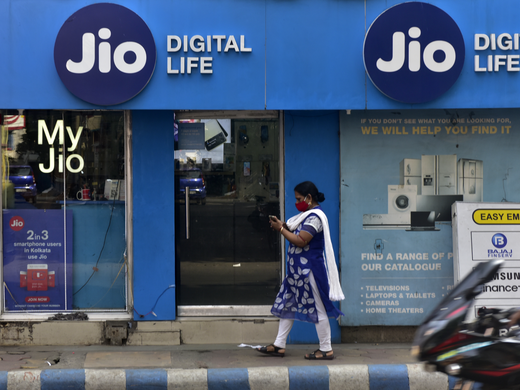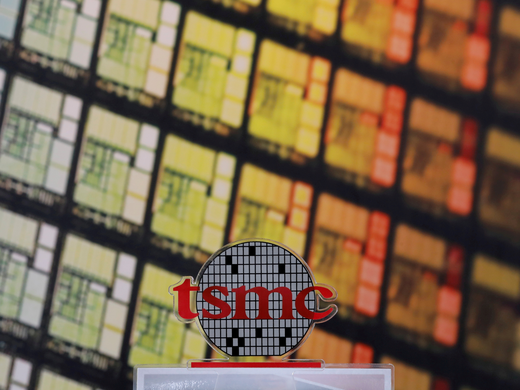Fifteen years after its founding, BRICS is embracing expansion. The bloc — named after its original members Brazil, Russia, India, China and South Africa — bills itself as a champion of the developing world and challenger to the so-called liberal democratic order. Ahead of the group’s summit in Johannesburg that ended on August 24, at least 40 countries were eyeing the opportunity to join. More than half of these submitted formal applications.
After two days of talks, BRICS welcomed Argentina, Egypt, Ethiopia, Iran, Saudi Arabia and the United Arab Emirates into its fold. All six countries will become formal members of the bloc on January 1, 2024. South Africa’s President Cyril Ramaphosa, the summit’s host, told media that further expansion is planned as well. While wrapping up the summit, he declared that BRICS “has embarked on a new chapter in its effort to build a world that is fair, a world that is just, a world that is inclusive and prosperous.”
An enlarged BRICS community, which will soon represent more than a quarter of the world’s GDP and include several key energy producers, is certain to expedite the rebalancing of global power away from the West. This will be true even if BRICS ultimately doesn’t evolve into a true rival to the Group of Seven (G7) — still a strong possibility, given the shortcomings of its founding members.
But at this point, the bloc’s mixed track record is largely irrelevant. Instead, its rising appeal throughout the developing world resembles an ink blot test: nations eager for an international system not dominated by the West see in BRICS what they wish to see. The bloc’s expansion is important not because of its potential, which is uncertain, but because it confirms the growing agency of states in the Global South to hedge their bets in an increasingly chaotic and fragmented world.
Seeking to Subvert the Status Quo
What began as a loose, informal alliance has over the past decade grown into a robust forum and network. Beneath its banner, government officials, lobbyists, industry associations and civil society groups are enhancing bilateral relations and formulating multilateral policies, primarily around trade and investment in emerging markets. Meanwhile, even before adding new members, the BRICS nations had overtaken G7 countries measured by share of global GDP based on purchasing power parity. Their population and youthful demographic also dwarf those of the Western world.
The bloc’s prime focus to date has been to counteract the West’s control of the global financial system. Despite being home to the majority of the world’s population, countries in the Global South are allocated far less voting power than are rich democracies, at the World Bank and International Monetary Fund (IMF). Both institutions are key arbiters of capital flows for international development.
The group’s chief accomplishment so far has been establishing the New Development Bank. Created in 2015 and headquartered in Shanghai, with regional offices in each of the BRICS’ founding countries, the bank was seeded with US$50 billion to fund infrastructure and sustainability projects in emerging markets. Its advocates claim it practises more inclusive international finance, in contrast with the IMF and the World Bank, which allegedly impose “neoliberal policies” on debt-distressed countries. Both entities often insist on government austerity measures and privatization of state assets as preconditions for issuing bailout loans.
Related to this focus are aspirations to dislodge the US dollar as the default global currency. The American greenback is used in 88 percent of international trades and accounts for 58 percent of foreign exchange reserves.
Fears and resentments in the developing world over the dollar’s dominance have been supercharged over the past two years. One reason has been the West’s ability to cut Russia from the global financial system and seize its assets. Another is the downstream effects of the Federal Reserve’s raising of interest rates to fight domestic inflation. Both actions are having negative fallout for low-income countries — the former, by stoking the price of energy and food staples; the latter, by hiking the cost of servicing dollar-dominated debt.
The New Development Bank’s chief financial officer said in July there is no imminent plan to create a BRICS currency. However, a framework for BRICS member banks to trade in local currencies, the Interbank Cooperation Mechanism, has existed since 2010. And were a BRICS currency to materialize, it could, in theory, spark de-dollarization. With its expansion, the bloc seemingly possesses the collective market size and a sufficient range of products to support an alternative global currency. The geographical dispersion of BRICS countries would also make evading dollar-based sanctions much easier.
But this outcome isn’t guaranteed. A common currency would require Beijing to loosen capital controls at a time when the ruling Chinese Communist Party (CCP) under President Xi Jinping is extending its grip on China’s economy. The New Development Bank also relies on dollars to execute more than three-quarters of its projects. And several joint BRICS initiatives have already failed after drawing similar hype — among them, the creation of a new credit rating agency and an undersea fibre-optic cable network.
The war in Ukraine has also raised the bloc’s profile by bolstering its calls to dismantle Western exceptionalism. This reaction stems partly from Western officials, led by President Joe Biden’s administration, framing the conflict in Europe as an existential clash between autocracy and democracy. That perspective in many ways rings true. But deploying it as a rallying cry has backfired beyond the West.
Developing nations have bristled at being told to pick a side in renewed great-power rivalry; doing so offers little immediate benefit but invites plenty of risk. Multiple votes at the United Nations last year underscore how most countries disagree in principle with Moscow’s decision to attack Ukraine. Yet governments representing two-thirds of the world’s population have declined to join Western sanctions against Russia, which they judge would undermine their economies. The sanctions are adding to the Global South’s sense of alienation from the West after years of broken promises around aid, and rich nations’ grandstanding on democracy and human rights as poor countries are buffeted by climate change and the struggle to deliver basic services.
However, while the appeal of the BRICS in the developing world is undeniable, so too are its internal divisions and the vulnerabilities of its founding members. Given how governments tend to deprioritize multilateral initiatives when problems pile up at home, these may blunt the group’s long-term impact.
Vladimir Putin’s brutal gambit in Ukraine has resulted in catastrophe for Russia.
Building on a House of Cards
Relative to their positions a decade ago, two BRICS members, Russia and South Africa, are severely weakened. China is also dealing with a range of problems that are inviting questions about whether the nascent superpower is approaching a near-term peak. India, a de facto rival of China, appears determined to keep its options open with the West. And then there is Brazil, whose economy is heavily subject to the boom and bust of commodity cycles, and where a former president’s loyalists present a destabilizing force.
Vladimir Putin’s brutal gambit in Ukraine has resulted in catastrophe for Russia. Aside from killing an estimated 50,000 Russian men and wounding tens of thousands more, it has shrunk the country’s labour force, compounding pre-existing population decline. By one estimate, the number of workers under age 35 in Russia fell by 1.3 million in 2022 alone. Many of those were bright young minds who fled abroad in protest of the war or to escape conscription.
The conflict has also rendered Russia a less desirable partner by puncturing the Kremlin’s reputation for strategic deftness. Western sanctions combined with botched offensives in Ukraine have sapped Russia’s military strength and caused its arms sales — a key source of foreign influence — to plummet by 90 percent. Moreover, the Wagner Group’s aborted mutiny in late June 2023 showed leaders elsewhere that Putin’s repressive police state is not immune to insurrection (even if the suspected assassination of mercenary leader Yevgeny Prigozhin shores up Putin's authority for now). The Kremlin then blindsided the developing world with its decision on July 17 to suspend the Black Sea Grain Initiative.
Brokered by the United Nations and Türkiye in July 2022, the deal allowed Ukrainian grain exports to transit through the Black Sea to help ease global food security pressures. By tearing up the agreement and renewing attacks on Ukrainian ports, Moscow risks elevating global food prices and aggravating hunger levels for millions of people across the Global South, including in Africa. Kremlin-linked entities have forged myriad relationships in the world’s youngest and fastest-growing region in recent years, in part by deploying disinformation campaigns in support of self-serving ruling parties. However, in an obvious sign of frustration, only 17 African heads of state attended the second Russia-Africa summit in late July hosted by Putin in his home city of St. Petersburg, compared to 43 at the first summit in 2019. The low turnout also reflects how Russia has very little to offer developing countries hungry for foreign investment and technology transfers.
South Africa’s slide into dysfunction has been slower, though more complete. The Rainbow Nation’s diversity, liberal constitution and broader industrialization compared to the rest of Africa have at times made it the continent’s voice on the global stage. However, they have also masked a nation in profound turmoil. A quarter century removed from apartheid, South Africa is still the most unequal country on earth. Pervasive corruption and cronyism during a period of uninterrupted rule by the African National Congress (ANC) since 1994 has the country nearing failed-state status.
Some US$34 billion in state resources went missing between 2007 and 2016 alone during the tenure of former president Jacob Zuma. He was nonetheless pardoned on August 11 by current President Cyril Ramaphosa on a contempt of court charge stemming from Zuma’s refusal in 2021 to testify in front of a panel investigating corruption during the latter’s presidency.
Private sector companies are now having to provide security and basic public services. Crumbling infrastructure run by heavily indebted state power utility Eskom results in rolling energy blackouts lasting upwards of 12 hours a day, paralyzing mining and manufacturing operations. Official annual unemployment rates since 1999 have averaged close to 22 percent and reached as high as 29 percent during the COVID-19 pandemic in 2021 and 2022. But even these figures are a massive undercount, as the metric only factors in those actively looking for work. Youth unemployment has been greater than 50 percent for essentially a decade. Volatile protests over lack of water, jobs, health care and education are a near-daily occurrence.
Such absence of opportunity is causing criminality to skyrocket. Organized gangs routinely extort land developers and sabotage rail lines and power plants in schemes to secure inflated labour and maintenance contracts. Truck drivers transporting coal, copper, platinum and other export commodities from inland sites to coastal ports are frequently held up by armed thieves who steal their cargo and sell it on the black market. In an economy reliant on natural resource extraction, but with more private security guards than police, this activity poses a grave, long-term threat to government revenues. So too does the ANC’s ideological affinity for Russia, which is jeopardizing market access to the United States — the country’s second-biggest trading partner. Business leaders told President Ramaphosa on August 1 that joblessness could reach 38 percent by 2030 unless the country’s self-inflicted barriers to economic growth are urgently solved.
In Brazil, the re-election of socialist President Luiz Inácio Lula da Silva has seen him show restraint from attempting to revive the big government policies of his first presidency from 2003 to 2010. Those policies had turned the former union leader into a leftist icon, but they were also underwritten by a lengthy China-fuelled commodities price boom — something unlikely to repeat in view of China’s lingering economic malaise coming out of the pandemic. Companies involved in Brazil’s lucrative mining industry also purchase most of their key equipment from Western manufacturers, requiring payment in dollars. Brazil’s education system also lags far behind peer countries in the Organisation for Economic Co-operation and Development, presenting a major hurdle to increasing its productivity.
And then there are questions around Brazil’s political future because of the legacy of radicalization left by his far-right predecessor Jair Bolsonaro. Known as “Bolsonaristas,” the former president’s loyalists still control the military and lower house of Congress and tacitly endorsed violent mobs of his supporters storming Brazil’s congress, presidential palace and supreme court buildings in January 2023. Similar to how foreign capitals are wary of Biden’s term being merely an interlude before another Trump presidency or similar “America First” era, they are also concerned that Brazil may relapse into inept authoritarian populism.
If there is one member of BRICS that has grown fundamentally stronger over the past decade it is India. Yet India is arguably the least willing to go all-in on the bloc’s future. Prime Minister Narendra Modi received a warm welcome from Biden during a visit to Washington, DC, in June. In a speech to Congress, Modi — widely expected to win re-election in 2024 — hailed a “new dawn” between the world’s two largest democracies. Their relationship, he said, was “a defining partnership of the twenty-first century” and would be “instrumental in enhancing the strength of the whole world.”
Indeed, India stands to benefit tremendously from how many Western governments view it as a linchpin in their plans to pivot supply chains away from China. Modi left Washington after signing a raft of new bilateral defence deals related to artificial intelligence and aerospace technologies worth billions of dollars, including the purchase of lethal drones and an agreement to jointly manufacture fighter-jet engines in India. Alongside Australia, Japan and the United States, India is also a part of the Quadrilateral Security Dialogue, better known as the Quad, which seeks to counter China’s influence in the Indo-Pacific. In late July 2023, India also agreed to explore closer cooperation with Japan on building semiconductors.
But for India’s economy to fulfill its potential, it needs to become more inclusive and fair — an imperative that clashes with the Hindu nationalist agenda of Modi’s ruling Bharatiya Janata Party. Entrenched cultural gender norms also contribute to a scenario where around 80 percent of India’s working-age women forgo seeking jobs. The country is severely underprepared for more intense climate change as well, in particular around heat-related deaths and food security. New Delhi has a penchant for knee-jerk decisions to ban rice exports at the earliest signs of crop troubles. This can roil markets and spark tensions with India’s trade partners given that India accounts for about 40 percent of the rice exports globally, the most of any country in the world.
Above all, BRICS’ future rests with China. Under President Xi, the CCP has expanded what has become known as rule by law: intentionally vague legislation and state institutions are used to suffocate dissent and promote the party’s dogma and interests. That approach will complicate Beijing’s efforts to legitimize BRICS as more than just a vehicle for the CCP’s global ambitions. Businesses, investors and bilateral partners prefer rule of law, where courts can be trusted to provide a check on government excesses and abuses.
That preference has been revealed in how China’s exit from the CCP’s draconian zero-COVID policies has not delivered the economic boom the party was hoping for. Instead, the exit has revealed major systemic problems. At the same time, as long as they are in place, sweeping US export controls on advanced chip-making technology appear capable of denying China its goal of achieving technological self-sufficiency. This includes new measures announced on August 9 that restrict American investment in Chinese technology firms.
Meanwhile, one in five Chinese youth are unemployed, and the country’s colleges and universities are still producing millions of graduates each year. President Xi has chosen to address this growing problem by borrowing from a popular Chinese parable to encourage China’s youth to embrace underemployment — or, in his words, learn to “eat bitterness.” A spokesperson for China’s National Bureau of Statistics announced on August 15 that the agency would temporarily stop publishing youth unemployment figures, saying it was reviewing its methodology.
These trends have dramatically reshaped the outlook China’s economic elite have for their own country. London-based investment migration consultancy Henley & Partners has published data suggesting around 11,000 Chinese high-net-worth individuals sought to emigrate abroad last year, more than the number of wealthy émigrés fleeing sanctions-hit Russia.
China’s history of instrumentalizing international friendships for its own benefit is no secret. Beijing is also engaged in a tense military standoff with India, just one of the many difficult relationships with its neighbours that are consuming its attention. The country’s addiction to coal also represents a massive moral and reputational risk, as it exacerbates the climate consequences being felt across the Global South. And were President Xi to act on his threats to annex Taiwan, Beijing would be directly responsible for throwing the global economy into chaos on a scale much greater than the early stages of Russia’s invasion of Ukraine.
All of this to say that China — and the opaque black box of elite party politics that guides its decision making — is hardly the trustworthy, all-capable partner it pretends to be. Neither are Brazil, Russia, India and South Africa. Or, by extension, BRICS as a whole.
What is certain is that, in coming years, developing nations will court the opportunities that come with competition, while becoming more resistant to coercive pressures.
Chaos Breeds Competition and Opportunities in a Multipolar World
The expansion of BRICS confirms countries in the Global South are becoming more assertive and pragmatic in pursuit of their own interests. By embracing a new-found level of self-determination, developing countries have already tipped geopolitics toward a new paradigm. One analyst at Goldman Sachs has coined this as the rise of geopolitical swing states. Whether BRICS will become a feature or a footnote in the history of this unfolding era remains to be seen.
What is certain is that, in coming years, developing nations will court the opportunities that come with competition, while becoming more resistant to coercive pressures. Argentinian political scientist Matias Spektor has written that “if it wants to remain first among the great powers in a multipolar world, the United States must meet the Global South on its own terms.” This view can be easily applied to the liberal democratic world as a whole.
Engaging the Global South as it becomes a bigger player on the world stage will require navigating ad hoc coalitions and bilateral relationships that are more individualistic and unpredictable, and less permanent. Exploiting areas of mutual benefit must take priority over the rigid pursuit of asymmetric policies. This will require paying more attention to the domestic realities of individual nations in the developing world.
Throughout the war in Ukraine, Western countries have consistently invoked the need to recognize and preserve the sanctity of national sovereignty. Going forward, they must now practise this same principle when dealing with developing countries that no longer view the West as the world’s hegemon.



